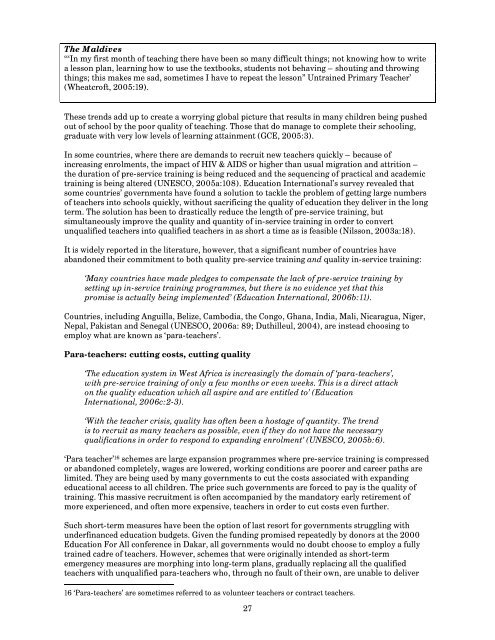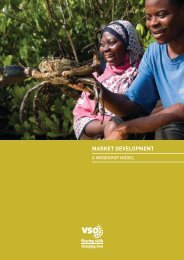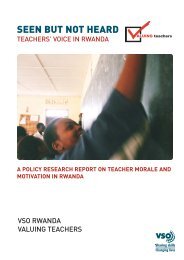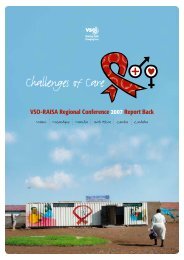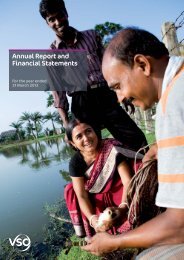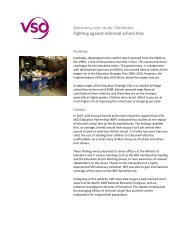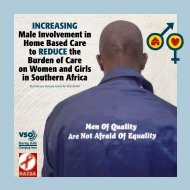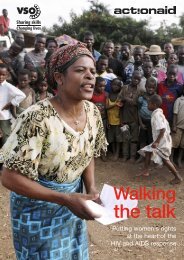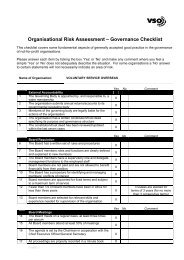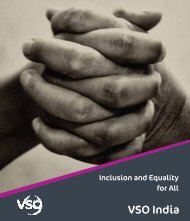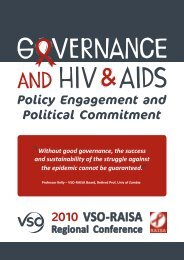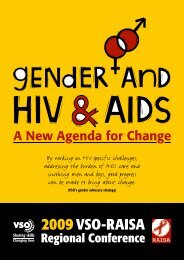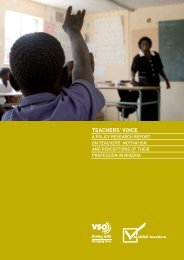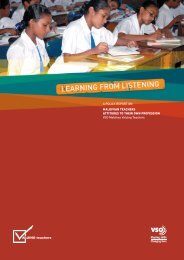Teachers for All â GCE policy briefing (566KB) - VSO
Teachers for All â GCE policy briefing (566KB) - VSO
Teachers for All â GCE policy briefing (566KB) - VSO
You also want an ePaper? Increase the reach of your titles
YUMPU automatically turns print PDFs into web optimized ePapers that Google loves.
The Maldives‘‘‘In my first month of teaching there have been so many difficult things; not knowing how to writea lesson plan, learning how to use the textbooks, students not behaving – shouting and throwingthings; this makes me sad, sometimes I have to repeat the lesson” Untrained Primary Teacher’(Wheatcroft, 2005:19).These trends add up to create a worrying global picture that results in many children being pushedout of school by the poor quality of teaching. Those that do manage to complete their schooling,graduate with very low levels of learning attainment (<strong>GCE</strong>, 2005:3).In some countries, where there are demands to recruit new teachers quickly – because ofincreasing enrolments, the impact of HIV & AIDS or higher than usual migration and attrition –the duration of pre-service training is being reduced and the sequencing of practical and academictraining is being altered (UNESCO, 2005a:108). Education International’s survey revealed thatsome countries’ governments have found a solution to tackle the problem of getting large numbersof teachers into schools quickly, without sacrificing the quality of education they deliver in the longterm. The solution has been to drastically reduce the length of pre-service training, butsimultaneously improve the quality and quantity of in-service training in order to convertunqualified teachers into qualified teachers in as short a time as is feasible (Nilsson, 2003a:18).It is widely reported in the literature, however, that a significant number of countries haveabandoned their commitment to both quality pre-service training and quality in-service training:‘Many countries have made pledges to compensate the lack of pre-service training bysetting up in-service training programmes, but there is no evidence yet that thispromise is actually being implemented’ (Education International, 2006b:11).Countries, including Anguilla, Belize, Cambodia, the Congo, Ghana, India, Mali, Nicaragua, Niger,Nepal, Pakistan and Senegal (UNESCO, 2006a: 89; Duthilleul, 2004), are instead choosing toemploy what are known as ‘para-teachers’.Para-teachers: cutting costs, cutting quality‘The education system in West Africa is increasingly the domain of ‘para-teachers’,with pre-service training of only a few months or even weeks. This is a direct attackon the quality education which all aspire and are entitled to’ (EducationInternational, 2006c:2-3).‘With the teacher crisis, quality has often been a hostage of quantity. The trendis to recruit as many teachers as possible, even if they do not have the necessaryqualifications in order to respond to expanding enrolment’ (UNESCO, 2005b:6).‘Para teacher’ 16 schemes are large expansion programmes where pre-service training is compressedor abandoned completely, wages are lowered, working conditions are poorer and career paths arelimited. They are being used by many governments to cut the costs associated with expandingeducational access to all children. The price such governments are <strong>for</strong>ced to pay is the quality oftraining. This massive recruitment is often accompanied by the mandatory early retirement ofmore experienced, and often more expensive, teachers in order to cut costs even further.Such short-term measures have been the option of last resort <strong>for</strong> governments struggling withunderfinanced education budgets. Given the funding promised repeatedly by donors at the 2000Education For <strong>All</strong> conference in Dakar, all governments would no doubt choose to employ a fullytrained cadre of teachers. However, schemes that were originally intended as short-termemergency measures are morphing into long-term plans, gradually replacing all the qualifiedteachers with unqualified para-teachers who, through no fault of their own, are unable to deliver16 ‘Para-teachers’ are sometimes referred to as volunteer teachers or contract teachers.27


